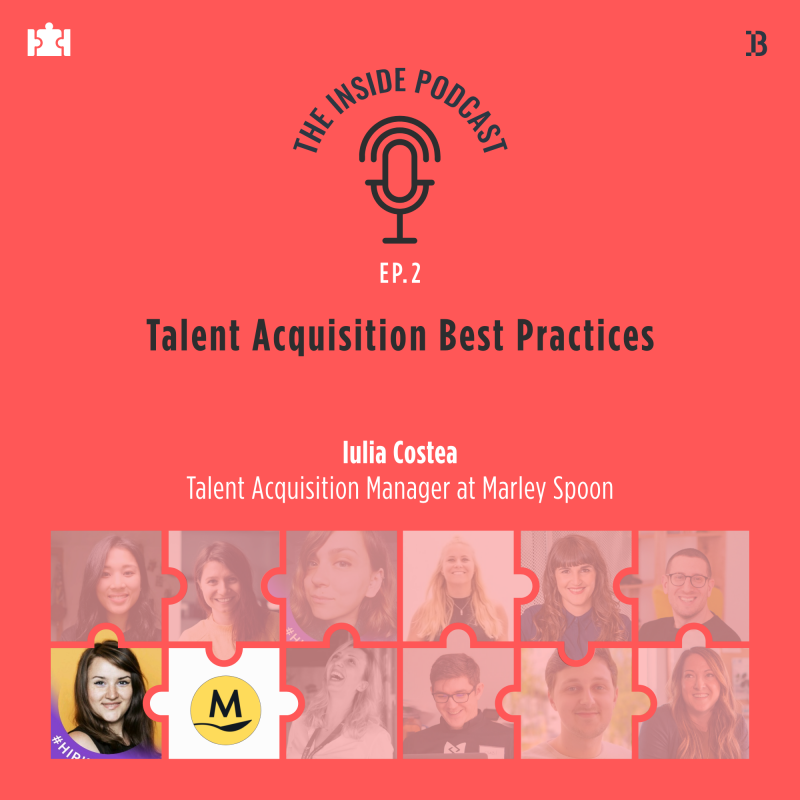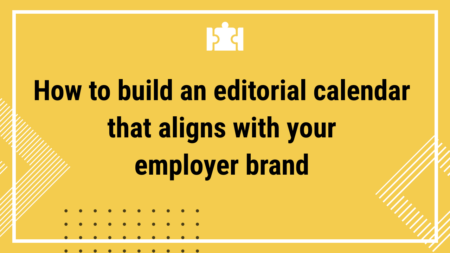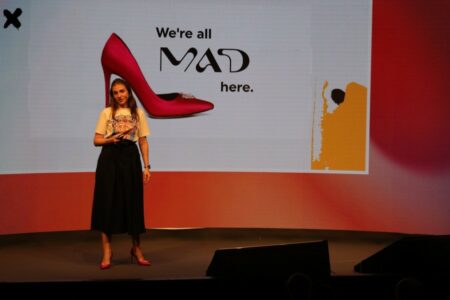Overview
Regardless of your experience in HR, employer branding, or talent acquisition, in Ep.2 of The Inside Podcast, you’ll be listening to Iulia Costea (Talent Acquisition Manager at Marley Spoon) shed some light on what it’s like to be a talent manager and recruit primarily tech professionals.
What you’ll learn by listening
By listening to the podcast, you’ll learn more about:
- What talent acquisition is
- Main differences between talent acquisition & recruitment
- Why adaptability & flexibility are the keys to success in both talent acquisition & recruitment
- Useful tips for the aspiring talent acquisition manager
- The human factor & why it matters most in HR
- Two books every HR/employer branding specialist should have on their reading list
- Expert advice: Best practices on recruitment & talent acquisition
About the company
Marley Spoon makes it easy to cook a delicious meal at home by sending tasty recipes and fresh ingredients directly to your door. With Marley Spoon, you’re in control—you decide what to eat, when to eat, and with how many. Leave behind the hassle of grocery shopping, say goodbye to food waste, and fall in love with cooking all over again!
Enjoy listening to Ep.2 of The Inside Podcast on Spotify!
Podcast transcription – Talent Acquisition Best Practices with Iulia Costea, @Marley Spoon
Georgiana: Good morning, Iulia. How are you doing?
Iulia Costea: Excellent!Thank you.
Georgiana: Thank you so much for accepting our invitation to take part in our 2nd podcast episode on employer branding, talent management, and HR related themes. I’ll just introduce you briefly. Iulia is an advisor for tech careers in Europe’s top tech hubs. She specializes in talent acquisition, recruitment and employer branding, and currently works for Marley Spoon where she’s Talent Acquisition Manager. Congrats!
Iulia has over 7 years of experience in HR and will be sharing with us today what it’s like to be a talent manager and to recruit primarily tech professionals. Just a brief introduction on Marley Spoon, which is a company that’s actually super dear to me. It has made my life as a mom super easy by delivering weekly packages, tasty recipes, and fresh ingredients directly to my door. I’ve seen Marley Spoon grow a lot since last year, and especially during the pandemic. And I’ve also seen it stay true to its values. And this is why I love the company so much. So please, Iulia, tell me exactly what does your role entail? What is talent acquisition?
Iulia Costea: Talent acquisition, basically, is what happens before recruitment, but also includes recruitment. So whether you create all of these strategies from where to attract your talents, it’s the talent attraction part as they are attracting new customers also, recruitment wise, we need a talent acquisition function to attract new candidates.
Georgiana: So that’s what you would say is the difference between talent acquisition and recruitment? Because in my mind, they were always sort of the same thing.
Iulia Costea: Yes. Talent acquisition is one step before but might also cover recruitment. It’s a broader term, which also includes the sourcing and finding of the talents, whereas recruitment is the actual process of recruiting and interviewing people.
Georgiana: Okay, got it. I imagine companies such as Marley Spoon grew a lot during this pandemic when everyone was ordering online, using the food delivery service to not go out so much. But I’m wondering what is it like to witness such a huge company growth and work from home? How do you manage it as a management professional and a recruitment professional? What was it like for you during this time?
Iulia Costea: Indeed, it was a bit of a roller coaster of emotions, especially at the very beginning when it hit. We didn’t know how to handle it properly. But of course, as humans, we’re very adaptable and flexible. We adapted to the new situation. Working remotely turned out to be quite easy. Company-wise, everyone adapted very well. And now we pretty much have a hybrid setup where people can still come to the office with certain regulations, masks, distancing. It wasn’t that bad, I must say, especially because the business grew a lot. We had some very successful times. So I think that made it easier for us to cope with the whole madness.
Georgiana: And if you were to choose, you were telling me when we met for coffee earlier, that if you were to choose, you would work from home and maybe just go to the office one or two days a week? Why is that?
Iulia Costea: I thought I could never work from home. I was never that type of person. But when I tried this over the past few months, I realized that I can be more productive. I save time by not commuting anymore and I still have energy after work to go out and do something. Whereas being the whole day in the office can be tiring. However, I don’t want to be remote all the time. Somewhere of a hybrid situation would be ideal.
Georgiana: Okay, super! What would you say is your favorite part of what you do?
Iulia Costea: My favorite part of what I do is when people accept job offers and join our company. And after a very tedious process, you get those people on board. That brings me huge satisfaction.
Georgiana: I can totally understand that. I know that people migrate a lot in Berlin from one job to another. And I know it’s so difficult to attract them. So I can imagine why these small successes are not really that small, and why this really makes you happy.
Iulia Costea: Absolutely. It’s the cherry on top.
Georgiana: Do you see yourself doing this for a longer time? Have you thought about it or not that much?
Iulia Costea: I think so. HR, in general, is a field that’s very dear to me. It’s also kind of a business field but with a lot of emphasis on people. And I like this combination.
Georgiana: I think that HR professionals who are really successful are exactly those who manage to mix the two successfully – the business part and the empathy part. Now a rather different question, a book that you’re currently reading?
Iulia Costea: A book that I’m reading at the moment is “Shoe Dog” by Phil Knight. It’s the founder of Nike back in the 60s. It’s a very inspiring book and also very funny. I love it.
Georgiana: I’ve seen it a lot and I was always wondering, is it as good as hype says it? So I guess I’ll try it.
Iulia Costea: So far, so good. I was also curious, that’s why I started reading it. Because I’ve heard way too many reviews, too.
Georgiana: As a marketing agency and as an employer branding professional, I work a lot with technology companies, and we help them recruit and maintain company talent. Many times tech companies can be these very cold, impersonal environments. But, of course, not always. We’ve come across cultures that are very warm and companies that are successful at creating this very cozy culture and company atmosphere. What would you say makes a difference? How does a good company succeed from the employer engagement perspective, from the perspective of creating a good, nurturing company culture?
Iulia Costea: I think that’s a very good point and super hard to tackle. I believe all companies are struggling with this. Looking at Marley Spoon at the moment, it’s a topic that’s on our daily agenda. How can we increase employee engagement? There’s no secret sauce, no overnight solution. First of all, there has to be a lot of buy in from the management for them to support a lot of initiatives that would help people strive and be happy in their environment, and then the team leads and the people department, so it’s a joint effort.
There’s not just one person that can coordinate everything. Everything has to be supported, including the employees. It’s more about awareness, management buy in, and some specific strategies. Because without a concrete plan with action steps – what we do to make sure our employees are successful – things are just drifting apart. Surveys and looking at the data are a very good wake up call to understand how your employees are feeling and then really take action based on what you discover in those surveys; assure people that they are heard.
Georgiana: I totally agree. As I was saying, Marley Spoon has a very good reputation and has the vibe of a company where people actually enjoy going to work. I told you that I had some issues at some point. And in discussing with customer service, I just realized that practically everything works from my point of view, of the consumer. Now that you tell me that a good part of creating a good company atmosphere is employee contribution, I think it makes sense. You can see it, in my opinion. So congratulations again on that. What is the funniest thing that’s ever happened to you in your career, as a talent acquisition manager? Has there ever been something that’s made you laugh?
Iulia Costea: In general, I’m a very funny person. And yet, looking and thinking back at my career, I am not able to pinpoint something in particular. So now I’m like ‘Oh, am I boring?’ The things that do happen a lot are not necessarily funny, but rather embarrassing. For instance, when you get into an interview with a candidate and maybe 15 minutes into it, you realize that you’re looking at the wrong CV. It happened twice in my life, which is okay. It could have been worse. I think this is probably the closest I’ve been to something funny. I’m sure there are plenty of other examples. I hope I’m not too boring.
Georgiana: I’m sure you’re not. Let’s go back to books a bit. Can you tell me a book that’s been super influential in your life so far?
Iulia Costea: Yes, I’ve got two of those. I remember, a few years ago, I was really struggling with time management, prioritizing, and getting into habits. I was all over the place and not being able to stick to anything. I discovered two books at the time. I read them and I felt like my life completely changed. One of them would be “Switch: How to Change Things When Change is Hard” (Dan Heath). And the other one is called “The Power of Habit” (Charles Duhigg). Both of them are all about building habits. When you run out of motivation, it’s important to have habits built within. So you don’t always have to tap into your motivation. And for me, that was life-changing.
Georgiana: That’s actually a very useful point. And I’m sure many people will find it useful. Has there ever been a blunder, a mistake, something that you’re ashamed of in your career that you can remember?
Iulia Costea: I wouldn’t call it a mistake. But it’s more like a blessing in disguise. Looking back, I felt like I was not really in control of my career. Things just happened and I went with the flow. Even entering recruitment was probably by accident because I wanted to start in marketing 7-8 years ago after graduation. But it didn’t happen and therefore my first job was in recruitment. I just carried on from there and I realized that was actually a good mistake. I liked it. And then I did agency recruitment, and then executive recruitment, and now tech recruitment. I felt I was a little bit all over the place, just taking whatever comes my way. But in the end, they all tied together perfectly. Looking back, it wasn’t really a mistake that I was not in control. I was just open to opportunities. And that made me into the professional that I am right now. I think I really embrace everything, so I wouldn’t call it a mistake, but rather a successful course of life.
Georgiana: And staying open and being adaptable, right? Could you offer three tips for an aspiring talent acquisition manager who’s just starting out and who would like to learn some useful things?
Iulia Costea: Absolutely. I have three of those. The first one would be that recruitment nowadays and talent acquisition, in general, is not just about being able to interview, but it’s actually being able to put data behind. It’s a very number and data-driven market. There’s a lot of people analytics and data analytics that goes into recruitment. The person interested to join the field should be able to strike a mix between empathy, having people skills, but at the same time being able to look at numbers, pull up reports, and improve processes in general to help the business. Ultimately, it’s important to know your data very well in order to be very efficient. The second tip would be recruitment and talent acquisition, HR, the people business in general. I would say networking is very important.
Go out and meet people! Attend conferences – online and offline and talk to people to see what other companies are doing. Always keep your options wide open – ears and antennas – because you don’t know where you get useful information from. Read articles, attend events, and be as open as possible, because there’s so much to learn, and you build your network in terms of professionals. Last but not least, my third tip would be something more of a general advice that would help in any career, and that is be a person that people want to work with. I cannot stress enough how important soft skills are over tech skills. You can be the best professional out there, but if you’re a jackass to work with, it’s all in vain. So make sure you are someone that people want to work with.
Georgiana: And be kind, right? That works for life in general, not just work.
Iulia Costea: Yes, you can never go wrong with being kind.
Georgiana: This brings me to our last question, should you have the possibility to do whatever you want in the company of your dreams? Let’s call it Marley Spoon. What would that be? Let’s say I don’t know, you have all the budgets in the world and all the possibilities. What would that be?
Iulia Costea: It may sound very cheesy, but besides recruitment, I would go for even more improved branding, employee engagement. The future of work is a topic that’s very dear to me, how we make sure that work becomes more and more of a happy place for people. We pass over the work-life balance, which I think it’s an old school concept. In my view, it’s more of ‘how do we make sure that work becomes part of someone’s life without being a struggle?’ I would stress the importance of discovering what people want and helping people succeed in their roles. I would stay close to the people’s business. And with more budget, I think there’s just so much to do.
Georgiana: I think it makes a lot of sense what you’re saying. The invitee that I had previously, Lavinia from eMag, was telling me the same thing. If she had the possibility, she would allocate a lot of money to improve learning and development and to offer the employees the possibility to choose a learning program for themselves. So I guess, yes, in the end, it all comes back to people, and offering them the possibility to be better at what they do, not just at work but outside of work, too.
Iulia Costea: And go for training or choose a learning experience at your job, and you will realize that it helps you overall in life as well.
Georgiana: Super Iulia. Thank you so much for accepting my invitation. We’ll be in touch and I hope to see you soon.
Iulia Costea: Absolutely. Hope to see you soon and thank you very much.






